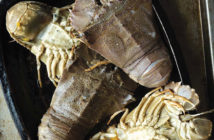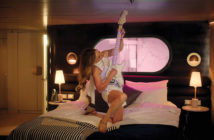A UK study found that the average person gains half a kilo a day on a two-week cruise. With an endless buffet, stacks of specialty restaurants and all the brightly coloured cocktails you can drink, it’s no surprise that most people come home with a little excess baggage. But for passengers who want to keep their weight down on board, a new breed of spa cuisine offers a lighter, healthier alternative to burgers, fries and rich desserts.
It’s part of the “destination spa” experience cruise lines are trying to create, mimicking those on land. Instead of just offering passengers a fitness centre and basic treatment rooms, onboard spas have expanded to offer a fully immersive experience including spa cabins, a separate food menu and, in some cases, even a dedicated restaurant serving spa cuisine. Chef Michel Stroot at California’s Golden Door spa resort pioneered the concept of spa cuisine in the 1970s, focusing on the freshness of seasonal wholefoods rather than using fat for flavour. Spa cuisine combines calorie-reduced, healthy cooking with eye-catching gastronomy of a high standard, emphasising moderation rather than deprivation.
Over the following decades, spa cusine became part of the industry’s vocabulary and tempting yet healthful dishes began appearing on menus across the world. Delta Airlines even picked up on it, introducing a spa menu on transatlantic flights in the late 1990s. Cruise lines were late adopters of the spa-cuisine trend, but just about every line now offers a separate menu or low-calorie options (carefully marked with a healthy looking leaf or a sweet little starburst) in the main dining rooms. Currently, just two lines offer a separate spa restaurant, Celebrity Cruises and Costa Cruises.
Celebrity Cruises opened Blu on Celebrity Solstice in 2008. The restaurant is exclusively for passengers in AquaClass, Celebrity’s specialised spa cabins. Adam Armstrong, commercial director of Celebrity Cruises Australia, says there has been a change in the mentality of passengers when it comes to onboard dining. “Australians in particular are redefining the culinary cruise experience. The traditional cruising dining options continue and at the same time we’ve changed the game for those seeking a more tailored experience,” he says. Armstrong believes AquaClass passengers are looking for a holistic experience on their cruise, encompassing accommodation, treatments, exercise and food. “While the concept of a spa restaurant is a relatively new one, it’s a result of the feedback and ideas we regularly seek from all our guests. Blu really sets out to complement the wellness experience for passengers and to provide an experience that extends beyond the spa treatment itself.”
Blu’s philosophy is not about denying yourself, but rather eating creative and delicious meals that happen to be healthy and light. You can have your steak, though it will be served with a truffle vinaigrette as opposed to a heavy béarnaise sauce. There are some treat items on the menu at Blu. “We still want to provide passengers with choice,” Armstrong says. “Guests can stick to lighter options or balance their meal with a wine or dessert.”
But you won’t stray too far; even the desserts are health conscious, such as low-fat frozen yoghurt, sugar-free vanilla ice-cream or guava ice parfait.



